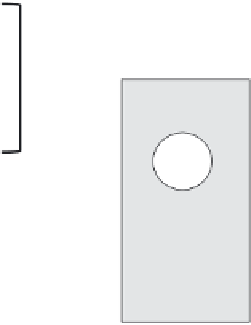Biology Reference
In-Depth Information
Reduced malaria parasite
sequestration
Malaria parasite clearance
IgE
complexes
Th1
Down-
regulation of
ICAM-1
Increased
NO production
B cells
Ascaris
and associated products
Macrophage
phagocytosis
Cytophilic
antibodies
Th2
CD4
Th0
HIV
viral inhibition
Antigen presenting cells
Treg
Th1
IL-2
HIV viral replication
Blocks
CD8
Treg
Th2
Leads to
Cytotoxic-induced
apoptosis of T cells
Increased numbers of T
cells for viral replication
FIGURE 4.2
Possible effects of Ascaris-induced immune responses on HIV and malaria
infection.
accompanied by a non-significant trend towards decreased viral loads.
42
The extent to which a similar effect may be observed in some populations
of Ascaris/HIV-co-infected individuals remains to be seen. Activated
CD4
T cells are essential for HIV replication. Decreased viral loads in
Ascaris/HIV-co-infected individuals could occur if generalized immu-
nosuppression during Ascaris infection limits CD4
þ
T cell activation and
proliferation and limits the main resource for HIVreplication. IL-2 is a key
cytokine required for T cell proliferation during T cell expansion in
response to stimulation through the Tcell receptor/CD3 complex.
43
It has
been reported that Ascaris infection can suppress vaccine-induced
immune response to oral cholera vaccine, and that this effect is associ-
ated with a deficiency in IL-2 production in response to the vaccine.
44
Since IL-2 is a key cytokine that facilitates CD4
þ
T cell activation it is
possible that, with respect to IL-2 production and IL-2 receptor respon-
siveness, an Ascaris-induced suppression of CD4
þ
þ
T cells may lead to
lower viral loads in HIV-co-infected individuals.
It is currently difficult to generalize about the effects of Ascaris
co-infection in HIV-infected individuals from current data. The relative
importance of interactions between immune responses generated by













































